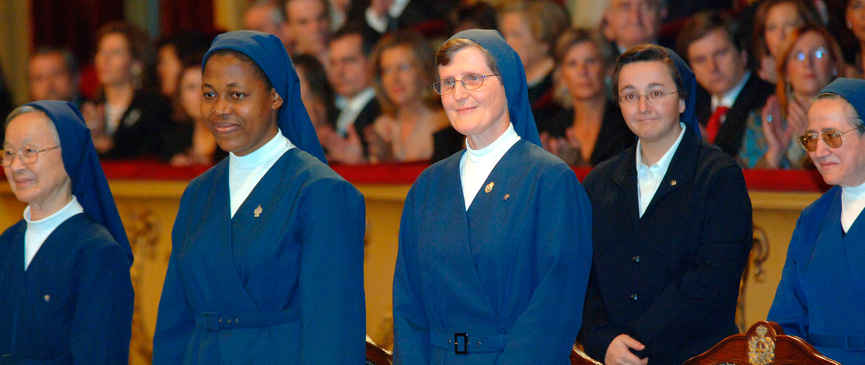Main content
The Daughters of Charity of Saint Vincent de Paul Prince of Asturias Award for Concord 2005

Founded in Paris by Saint Vincent de Paul and Saint Louise de Marillac in 1633, the organisation did charitable work in France and Poland during the seventeenth and eighteenth centuries. It reached Spain around 1790, and broadened the scope of its work during the nineteenth century to almost every European and Latin American country, as well as to countries in North America, Asia, Africa and Oceania. It has continued to expand worldwide during the twentieth century right down to the present day. The congregation is now present in almost a hundred countries in Africa, South America, Asia and Europe.
The spirit of the Daughters of Charity is founded upon practicing the virtues of humility, simplicity and charity, alongside those of respect, compassion and cordiality, to serve the poor with true devotion. The Daughters dedicate their lives to caring for the forgotten, the sick and the deprived all over the world. They do a wide range of humanitarian and social work, whilst also working for justice, peace and solidarity. They run school kitchens, centres for mothers and the newly born, and hospitals for victims of aids, leprosy and tuberculosis in Third World countries such as India, Libya, Angola, Bolivia, Cameroon, Congo, Ghana, Rwanda, Haiti, Honduras, Mauritania, Madagascar, Morocco, Mozambique and Dominican Republic. They also build schools and are responsible for the schooling of children and adolescents. Their work is proving itself fundamental both to the rebuilding of countries ravaged by the latest catastrophes of Nature and to the ever-increasing number of refugee camps around the world.
The work of the Daughters of Charity also encompasses the developed world. They are there to serve those who are most in need, in hospitals, schools, pastoral care centres, homes for children and battered women, old people's homes, shelters for the homeless, homes for convalescing mothers unable to support themselves, sheltered accommodation, occupational workshops and drug rehabilitation centres. They organise cooperatives to distribute food, provide home help for the elderly, and also care for people with mental health problems and with physical disabilities, young people lacking social and family support, prison inmates and immigrants, with whom they work towards social integration. They have been a beacon of hope for deprived neighbourhoods and society's more underprivileged groups for 372 years, striving to cater for the most urgent needs in each particular location, and running social, health and educational projects based upon deeds of solidarity.
End of main content
